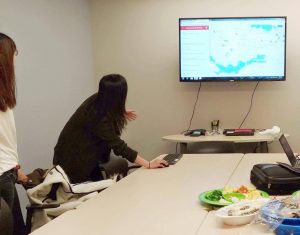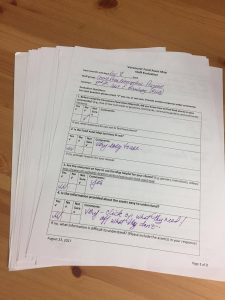Goodbye from us…

Retrieved from https://www.ffonts.net/Farewell.font
Hello and welcome to our last blog post of the term!
December is just around the corner and our project is already approaching its end. It was an amazing experience working with Vancouver Coastal Health on the VFAM project, during which we have encountered many meaningful challenges and surprises. We want to use this blog post to reflect on our moments of significance pertaining to our overall experience and learning during our LFS 350 course as well as the community project.
What
One moment of significant that we have encountered as group came about after leading our feedback session with community partner, Kathy. In the beginning of the term, we had initially thought that instructions in LFS 350 and our community project procedure were to be given out in full detail. However, after reflecting back to our feedback session and our journey throughout this term, we have noticed that not only are we closer in completing the project and the course, but we have also realized that the structure of the course was quite flexible, and it had provided us with opportunities which enhanced our learning and developments of creativity and teamwork. We received much more freedom from both our course instructors/teaching assistants and from our community partner than we would have expected. This freedom led many of us feeling uncertain because we are normally not given much choice in our education system. From pre-school up till post-secondary education, students are usually taught in school systems with industrial age values, where instructions are clearly indicated and school performances are evaluated through exam scores (Next School, 2016). Being given the opportunity to lead for example, the feedback session, made us feel uncomfortable due to the uncertainty. For example, one of the staff members from Evergreen Community Center questioned us about the actual feasibility of the map, which we have never thought about. Based on the staff’s experience, most of her clients are “extremely marginalized”, where they are isolated, uneducated, and have neither internet nor electronics access. Our group did not consider these points until they were brought up during the feedback session. We were glad that despite the uncertainty when given the role of leading the feedback session, our group managed to receive constructive feedback from people who use the food asset map for their clients.
In addition, we were given not only freedom but many responsibilities throughout our journey of working this project. Before we started working on the Vancouver Food Asset Map, we were not expecting to be helping out additional events outside of the requirements. Some of our team members went to event at Vancouver Technical Secondary High School to help promote the food asset map to parents, which required taking the initiative to participate in more than what is required.


So What
The uncertainty offered in this class matters because it encourages critical thinking and made us more prepared for all possible outcomes in the future. Research shows that uncertainty facilitates a deeper and more transferable understanding of learning (Overoye, 2015). People learn through questions. Questions provide a multi-perspective approach of looking at and solving one problem. For instance, the doubts we received from the feedback session did reveal some limitations of the VFAM. By having someone else bring up the question and building up on that, we are able to carry out a more comprehensive and considerable food asset map that benefits every individual. Besides, uncertainty is an accurate reflection of the modern day food systems’ characteristics. Coming into contact with uncertainty in this course would help equip us before we enter the global food system as professionals.
After repeated exposure to the feeling of uncertainty throughout LFS 250 and 350, we gained a lot more in terms of skill sets and were able to get a sneak preview of what work will be like after graduation. In fact, the VFAM project itself is hosted and utilized by dieticians and social workers, so we now already have some experience in the actual work. We realize that in real world situations, we may not be always be told what to do and there will be times when it is up to us to make decisions. Some skill sets we learned include communications and collaboration, independent working, leadership, and self-disciplined. These are all valuable skills that we can apply to our future career in the real world.
Now What
In the foreseeable future, we hope to utilize skills gained from class, such as the ability to work and communicate in groups, confidence in dealing with uncertainties and complexities, as well as experience in working with food systems experts in our future careers. The experiences we had working with food systems in LFS 250 and 350 will likely prove to be valuable soon. It was frustrating and challenging at times, but it will make us better professionals in the global food system (Dokko et. al, 2008).
We thank you for following our journey and reading all our blogs. We greatly appreciate the opportunity to work with Vancouver Coastal Health we want to thank our community partner, Kathy Romses, for trusting us in leading the project this term. Also, we are honoured UBC provided us a chance to encounter and experience what working in the real world is like. Although this is the last step of our community-based experience learning, we are glad that there will be more UBC students participating in building the map and assisting more food insecure population in the future.

Retrieved from https://www.pinterest.ca/pin/543528248768527693/
Reference
Dokko, Gina, et al. “Unpacking Prior Experience: How Career History Affects Job Performance.” Organization Science, vol. 20, no. 1, 2009, pp. 51–68.
Next School. (2016, December 15) 6 Problems with our School System. Retrieved from https://www.youtube.com/watch?v=okpg-lVWLbE&feature=youtu.be
Overoye, Acacia L. Harnessing the power of uncertainty to enhance learning. (2015). Translational Issues in Psychological Science, 1(2), 140-148.